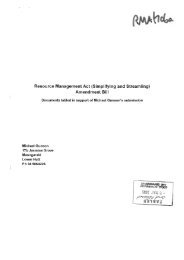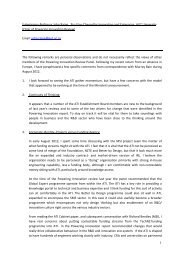Full paper text [PDF 3515k] - New Zealand Parliament
Full paper text [PDF 3515k] - New Zealand Parliament
Full paper text [PDF 3515k] - New Zealand Parliament
Create successful ePaper yourself
Turn your PDF publications into a flip-book with our unique Google optimized e-Paper software.
CASE STUDY:<br />
Dental care – is this the right child?<br />
A 5-year-old girl received dental treatment<br />
on two consecutive days without<br />
permission or even the knowledge of her<br />
grandparents who are her legal guardians.<br />
The child suffered lip trauma from the<br />
dental treatment. The grandmother’s<br />
enquiries revealed the child had been<br />
treated in error and that they had initially<br />
been misled by the therapist.<br />
They received a response advising that a<br />
full investigation would be undertaken<br />
and an offer to meet to discuss the matter.<br />
The grandmother sought advocacy help<br />
to prepare for and attend the meeting<br />
with them. At the meeting the provider<br />
apologised and advised a full investigation<br />
was being undertaken by the Quality<br />
Team. The complainant received full<br />
details of the treatment provided plus<br />
an acknowledgement that the child was<br />
mistaken for another and should not have<br />
received any treatment.<br />
The grandmother requested a written<br />
apology from the therapist, and to have<br />
all future dental care provided by a private<br />
dentist. The meeting concluded with<br />
the provider saying they would send the<br />
results of the investigation to<br />
the grandparents.<br />
Following receipt of the investigation<br />
report the grandmother asked the<br />
advocate to support them at another<br />
meeting with the provider. The outcome<br />
from that meeting confi rmed that the<br />
provider will fund the child to have free<br />
dental care with a private dentist outside<br />
of the DHB’s Oral Health Service until the<br />
end of year 8. It was also agreed that a<br />
letter of apology from the therapist would<br />
also be sent to the child.<br />
CASE STUDY:<br />
Loss of speech following multiple strokes<br />
The son of a rest home resident who<br />
is unable to speak or write following<br />
multiple strokes contacted an advocate,<br />
as she appeared to him to be unhappy<br />
at the rest home. The advocate agreed to<br />
visit the resident. Through a combination<br />
of signs, writing and yes/no questions, she<br />
told the advocate that she is very unhappy<br />
that she can’t live at home but knows that<br />
it is not practical for her to go back there.<br />
Although she was generally happy with<br />
the way the staff at the rest home treated<br />
her, she did fi nd it distressing when they<br />
spoke to each other over her head as if<br />
she couldn’t understand them. She asked<br />
the advocate if it would be possible to<br />
organise a meeting with the manager<br />
while the advocate was present.<br />
The manager was happy to meet and the<br />
advocate assisted the resident to relay her<br />
concerns about how staff spoke about her<br />
rather than to her. The manager agreed<br />
to address these communication issues<br />
with the staff. The contact details for the<br />
advocate were placed on her notice board<br />
with a copy on her fi le in case she<br />
HDC ANNUAL REPORT 2012<br />
To prevent this from happening again,<br />
protocols are being developed to ensure<br />
the correct child is treated. In the<br />
meantime a system has been put in place<br />
where the teacher must receive a note<br />
from the therapist requesting the child,<br />
and the teacher must tick a register to<br />
confi rm the correct child has been sent<br />
for treatment.<br />
The grandparents were happy with the<br />
outcome of the investigation and that<br />
systems had been put in place to ensure<br />
the right child received the right<br />
treatment in future.<br />
needed advocacy assistance in the<br />
future. The resident was very pleased<br />
with this outcome.<br />
Rest home staff have contacted the<br />
advocate on two occasions after the<br />
consumer presented them with the card<br />
left by the advocate. At the second visit<br />
the resident introduced the advocate to a<br />
staff member who she can communicate<br />
well with. Her subsequent complaints<br />
have not related to communication,<br />
which she describes as working well<br />
since the meeting.<br />
19<br />
CASE STUDY


![Full paper text [PDF 3515k] - New Zealand Parliament](https://img.yumpu.com/11267192/21/500x640/full-paper-text-pdf-3515k-new-zealand-parliament.jpg)



![Full evidence text [PDF 8908k] - New Zealand Parliament](https://img.yumpu.com/14025494/1/184x260/full-evidence-text-pdf-8908k-new-zealand-parliament.jpg?quality=85)
![−3 JUN 2009 IRELEASED] - New Zealand Parliament](https://img.yumpu.com/12829724/1/185x260/3-jun-2009-ireleased-new-zealand-parliament.jpg?quality=85)


![Full evidence text [PDF 9k] - Parliament](https://img.yumpu.com/7938085/1/184x260/full-evidence-text-pdf-9k-parliament.jpg?quality=85)





